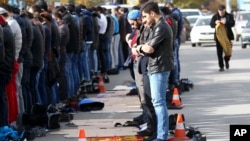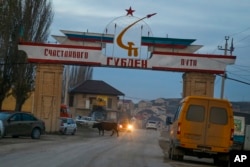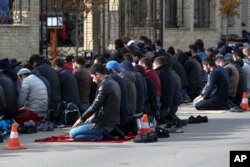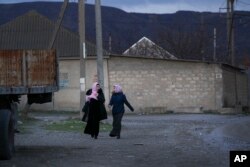Nadir Medetov, also known as, Nadir Abu Halid, was supposed to be under house arrest at his home in Dagestan, a republic in Russia’s North Caucasus region, when he appeared last year on an Islamic State video in Syria pledging allegiance to IS leader Abu Bakr al-Baghdadi.
The decision by Medetov, a 32-year-old Salafist with thousands of young followers in the North Caucasus, to join IS, led to a flow of new recruits for the radical Islamist group, analysts and Russian intelligence officials say.
At least 3,000 Russian citizens are fighting alongside IS and other Islamist groups in Syria, according to Alexander Bortnikov, director of the Federal Security Service, or FSB, Russia’s main security agency.
Independent experts say Bortnikov’s numbers do not reflect reality — which, they say, is “much worse.”
At least 7,000-to-10,000 aspiring Islamist fighters left Russia and “half of them reached Syria,” Denis Sokolov, a senior research fellow at the Russian Presidential Academy of National Economy and Public Administration, told VOA.
Dagestan – an IS hub
Dagestan alone provided at least 5,000 fighters to IS, says Ahmet Yarlykapov of the Russian Academy of Sciences.
The largest of Russia’s seven North Caucasus republics, Dagestan is a multiethnic and predominantly Muslim region at the foot of Caucasus Mountains, bordering Georgia and Azerbaijan. The region has a centuries-long history of armed resistance against Russian colonization.
Over the last two decades, Sunni Muslims in Dagestan have been increasingly gravitating toward ultraconservative Salafist ideas. After the second war in Chechnya, where a separatist struggle gradually transformed into a religious jihad against Russia, ended in 2000, neighboring Dagestan became the home base for the self-declared Caucasus Emirate, a militant jihadist group with active cells in cities and villages across the Caucasus.
The Caucasus Emirate took responsibility for hundreds of attacks in Russia, including dozens of suicide bombings, during the late 1990s and early 2000s. With the emergence of IS, most of the Caucasus Emirate jihadists left Russia for the battlefields of Syria and Iraq.
IS propaganda has targeted other adherents who remained at home in the North Caucasus. “Leave the mosques, fade into the crowd, and strike when the enemy least expects it, just like our brothers have done in Paris,” says one of the many Russian-language videos that Dagestani IS fighters in Syria have distributed via websites and social networks, addressing their kin back home.
Kremlin’s response to threat
Russia’s National Anti-Terrorism Committee says the security threat from IS fighters returning home to Russia is imminent and cannot be overestimated. With this threat in mind, Russia reformed its criminal law to allow the prosecution of individuals who have participated in armed conflicts in foreign countries “against Russia’s national interests.”
However, ex-fighters are highly unlikely to remain undetected by law enforcement once they return to Russia, experts say. “For the rest, returning is not an option, deaths in IS are quick and numerous,” says Varvara Pakhomenko, a Europe and Central Asia analyst with the International Crisis Group. “Dozens tried returning, and dozens get caught and imprisoned.”
Robert Schaefer is a U.S. Army Special Forces (Green Beret) and Eurasian Foreign Area officer who is a counterinsurgency expert and author of the book “The Insurgency in Chechnya and the North Caucasus.”
He told VOA that the FSB knows who the Russian fighters in the Middle East are and who their family members are back home, which makes it easier to identify them if they return to Russia.
“The idea is that the Russians will make it easy for the fighters to leave Russia, but it will be very difficult or impossible to return,” Schaefer said.
Meanwhile, Kremlin policy towards the North Caucasus heavily relies on military force, often used disproportionately. This, say experts, is major factor in radicalizing the region.
“What Russia is doing in the North Caucasus is called repression - brutal repression,” Ekaterina Sokirianskaia, the Europe and Central Asia Project Director at the International Crisis Group told the VOA. According to an ICG report, forced disappearances, extrajudicial executions, torture in detention are routinely practiced by Russian security forces.
Extremist watch lists
Local police in the North Caucasus are tasked with collecting the personal data of all suspected Islamists, who are then put on extremist watch lists that are provided to the FSB. Locals call these lists vakhuchyot – a Russian-language abbreviation for the words “Wahhabi” and “count.”
According to Dagestan’s chief prosecutor, 15,000 residents of the republic are on the watch lists. There are no official numbers for Russia as a whole or the North Caucasus region. Moscow-based journalist Maxim Shevchenko claims that the total number of people on the watch lists is more than 100,000.
“I had no idea I was on the vakhuchyot until the police stopped my car at a checkpoint and I was detained,” a 23-year-old resident of Dagestan who preferred to remain anonymous told VOA via Telegram from Istanbul. “The officer then told me [it was] ‘because you wear a beard and you go to the Wahhabi mosque’.”
He said that while in detention, he was fingerprinted and videotaped -- including walking and speaking – and that samples were taken from him for a DNA test, all without his consent. Complete information about his wife and children was also recorded. Since then, he said, he has been routinely detained and arrested, and all his movements have been monitored.
“I bought a one-way air ticket from Makhachkala (Dagestan's capital) to Istanbul for my whole family,” the young Dagestani told VOA. “The customs officer at the airport called an FSB officer in as soon as I presented him with my passport. They took me in and asked a few questions: Where was I going? I said to join my brothers. They let me go.”
Asked whether he has ever considered joining IS in Syria or Iraq, the Dagestani man answered: “No, I never thought of it.”
“Before 2012, the FSB was pushing youth into the woods,” the ICG’s Sokirianskaia said, using the Russian colloquial expression for people joining the insurgency, whose members often hide out in the forests of the North Caucasus. “When the preparations for the (2014) Sochi Olympics began, they started helping suspected radicals get out of country.”
In Syria while under house arrest
Nadir Medetov, the 32-year-old Dagestani Salafist, was arrested by the Russian security services in October 2014 in Makhachkala, in front of the mosque where he served as imam. He was charged with possession of illegal firearms and placed under house arrest.
The arrest sparked mass street protests by Dagestan’s Salafist community, and the authorities responded by launching a counter-terrorism operation in Makhachkala and closing down the mosque. Two months later, a court extended Medetov’s house arrest indefinitely, and put him under round-the-clock surveillance.
Four months later in May 2015, Medetov was in Syria.
Some experts believe Medetov was able to escape house arrest in Dagestan and travel to Syria not due to a security lapse, but because of a deliberate Kremlin strategy of “exporting extremism.”
Russian law enforcement, said Sokirianskaia, is “indirectly and directly involved in pushing alleged Caucasus extremists abroad.”
Denis Sokolov goes further. “They are not only facilitating the exodus, but even profiting from the suspected extremists via corruption schemes,” the Moscow-based expert said.
Alexander Ignatenko, a member of the Russian president’s Council for Cooperation with Religious Associations, dismisses such claims.
“It’s all slander and nonsense,” Ignatenko told VOA’s Russian Service in Moscow.







